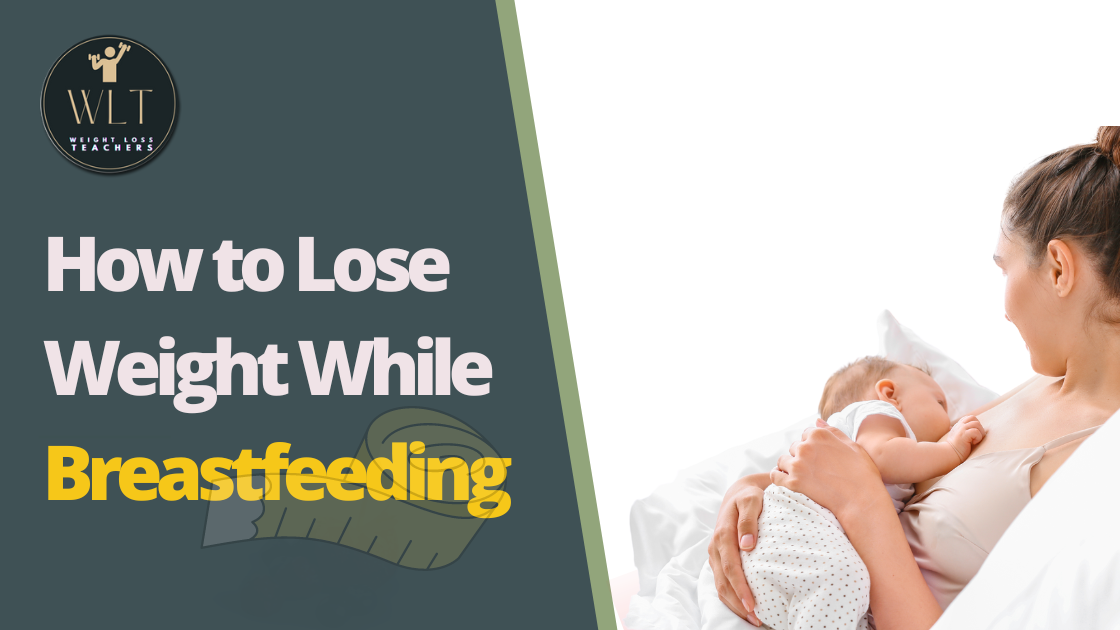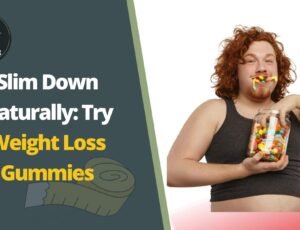
How to Lose Weight While Breastfeeding

The postpartum period is a time of significant change and adjustment for new mothers. As they navigate the challenges of caring for a newborn, they often find themselves grappling with the desire to shed the extra weight gained during pregnancy. For breastfeeding mothers, this task becomes even more complex, as they must balance their weight loss goals with the need to provide adequate nutrition for their baby.
Table of Contents
Introduction
In this comprehensive guide, we will delve deeper into the topic of losing weight while breastfeeding, offering a wealth of tips, strategies, and insights to help new moms on their journey towards achieving a healthy weight while ensuring their own well-being and that of their child.

The Importance of Breastfeeding

Benefits of Breastfeeding for the Baby
Breastfeeding is a remarkable source of nutrition for newborns, providing them with a host of essential nutrients and antibodies that support their immune system, promote healthy growth, and contribute to optimal development. Breast milk contains the perfect combination of proteins, carbohydrates, and fats, tailored specifically to meet the baby’s evolving nutritional needs.
The antibodies present in breast milk help protect the baby from infections and illnesses, providing them with passive immunity during their early months. These antibodies work in tandem with the baby’s developing immune system, boosting their resilience and reducing the risk of allergies, asthma, and respiratory infections.
Furthermore, breast milk contains growth factors and enzymes that aid in the maturation of the baby’s gastrointestinal system. The unique composition of breast milk supports the development of healthy gut flora, which plays a crucial role in digestion, nutrient absorption, and immune function.
Benefits of Breastfeeding for the Mother
Breastfeeding offers numerous advantages for mothers as well. During the postpartum period, the uterus undergoes involution, returning to its pre-pregnancy size. Breastfeeding stimulates the release of oxytocin, a hormone that aids in this process by promoting uterine contractions. These contractions help reduce postpartum bleeding and support a faster recovery.
Research suggests that breastfeeding may lower the risk of certain cancers, such as breast and ovarian cancer. The hormonal changes that occur during lactation, including the suppression of ovulation, can have a protective effect on breast tissue. Additionally, the extended duration of breastfeeding over a woman’s lifetime has been associated with a reduced risk of ovarian cancer.
One of the widely recognized benefits of breastfeeding is its potential role in aiding weight loss for the mother. Breastfeeding stimulates the body to burn calories to produce milk, which can contribute to postpartum weight loss. On average, breastfeeding can burn up to 500 calories per day. However, it is important to note that individual results may vary, and weight loss while breastfeeding should be approached with caution and in consultation with healthcare professionals.
Understanding Weight Loss While Breastfeeding

The Challenges of Losing Weight While Breastfeeding
Losing weight while breastfeeding poses unique challenges. Hormonal changes, such as elevated levels of prolactin and oxytocin, can influence appetite and fat storage, making it more difficult to shed excess weight. Additionally, some women may experience increased hunger and cravings while breastfeeding, which can make it challenging to maintain a calorie deficit.
Moreover, breastfeeding mothers need to ensure an adequate milk supply for their babies. If calorie intake is severely restricted, it can negatively impact milk production and nutrient composition, potentially compromising the baby’s nutrition. Therefore, a delicate balance must be struck between weight loss goals and ensuring optimal breastfeeding.
3.2 Timing and Safety Considerations
Timing plays a crucial role in postpartum weight loss. It is generally recommended to focus on establishing a healthy breastfeeding relationship, allowing the body time to recover from childbirth before actively pursuing weight loss goals. This period, typically the first six to eight weeks, allows for healing, hormonal stabilization, and milk supply regulation.
It is important to prioritize safety during weight loss while breastfeeding. Crash dieting or extreme calorie restriction can have adverse effects on both the mother’s health and the baby’s well-being. Rapid weight loss can release toxins stored in adipose tissue into breast milk, potentially affecting the baby. Gradual weight loss, at a rate of 0.5 to 1 pound per week, is generally considered safe and sustainable.
Additionally, it is crucial to consult with healthcare professionals, such as a doctor or a registered dietitian, who can provide personalized guidance based on individual circumstances. They can assess the mother’s overall health, nutritional needs, and breastfeeding requirements to develop a safe and effective weight loss plan.
Building a Foundation for Healthy Weight Loss

Mental and Emotional Preparation
Embarking on a weight loss journey while caring for a newborn requires mental and emotional preparation. It is important to approach weight loss with a positive mindset, acknowledging that progress may be gradual and that self-care and self-compassion are essential components of the process.
Setting realistic goals is key to maintaining motivation and avoiding feelings of frustration or disappointment. It is important to remember that every individual’s weight loss journey is unique, and comparison to others should be avoided. Instead, focus on personal progress and celebrate small victories along the way.
Self-care activities play a vital role in mental and emotional well-being. As a new mother, finding time for oneself can be challenging, but even small moments dedicated to self-care can make a significant difference. Engaging in activities that promote relaxation, such as reading, taking a warm bath, or practicing mindfulness, can help reduce stress and improve overall emotional balance.
Establishing a Support System
Having a strong support system can greatly contribute to a mother’s weight loss journey. Family members, friends, and online communities can offer encouragement, practical assistance, and a listening ear. Sharing experiences with other breastfeeding mothers who are also pursuing weight loss goals can foster a sense of community and provide valuable insights and tips.
Communicating one’s needs to loved ones is essential. Requesting support with household tasks or baby care can free up time and energy for focusing on personal health goals. Additionally, expressing concerns or seeking guidance from healthcare professionals, such as a lactation consultant or a support group, can provide specialized advice and address any breastfeeding-related challenges that may arise.
In conclusion, the challenges of losing weight while breastfeeding are significant, but with the right strategies, mindset, and support, it is possible to achieve a healthy weight while ensuring the well-being of both the mother and the baby. By understanding the benefits of breastfeeding, recognizing the challenges, and building a solid foundation of mental and emotional well-being, new mothers can embark on their weight loss journey with confidence. In the next chapters, we will delve into practical strategies for nourishing the body, incorporating exercise safely, and managing lifestyle factors to support successful weight loss while breastfeeding.
Note: There might be affiliate links mentioned here. We may receive a commission if you purchase a product through an affiliate link. There is no additional charge for you. Please do your own research before making any online purchases.
Nourishing the Body

Eat a Balanced Diet
A balanced diet is crucial for both weight loss and breastfeeding success. It ensures that both the mother and the baby receive the necessary nutrients for optimal health and well-being. Aim to include a variety of foods from all food groups in your meals.
Fruits and vegetables provide essential vitamins, minerals, and fiber. Incorporate a colorful array of fruits and vegetables into your diet to ensure a wide range of nutrients. Whole grains, such as quinoa, brown rice, and whole wheat bread, provide sustained energy and fiber. Lean protein sources like chicken, fish, tofu, and legumes are important for muscle repair and growth. Don’t forget healthy fats like avocados, nuts, and olive oil, which support brain function and hormone production.
Avoid fad diets or restrictive eating patterns, as they can deprive your body of essential nutrients needed for both you and your baby. Instead, focus on nourishing, whole foods that provide a wide range of nutrients. Listen to your body’s hunger and fullness cues and eat mindfully, savoring each bite.
Tracking Your Calories
Tracking your calories can help you stay within a healthy calorie range for weight loss. It provides awareness of your intake and helps you make informed choices. However, it’s important not to become obsessive or overly restrictive with calorie counting.
Choose a tracking method that suits your lifestyle, whether it’s using a mobile app, keeping a food diary, or consulting with a registered dietitian. Set a realistic calorie goal based on your individual needs, taking into account factors such as breastfeeding, activity level, and weight loss goals. Aim to consume at least 1500-1800 calories per day while breastfeeding, and avoid dropping below this range.
Remember that quality matters as much as quantity. Focus on nutrient-dense foods that provide a high level of nutrients per calorie. This ensures that you and your baby receive essential vitamins, minerals, and antioxidants. Be mindful of portion sizes and avoid mindless eating. Balancing your plate with a mix of carbohydrates, protein, and fats will help keep you satiated and provide sustained energy throughout the day.
Key Nutrients for Breastfeeding Mothers
Breastfeeding mothers have specific nutritional needs to support their own health and milk production. Several key nutrients are of particular importance during this time.
Protein is essential for tissue repair and growth, as well as milk production. Include lean sources of protein such as poultry, fish, eggs, dairy products, legumes, and tofu in your meals.
Iron is important for energy production and preventing iron-deficiency anemia. Incorporate iron-rich foods like lean meats, beans, lentils, fortified cereals, and leafy green vegetables into your diet.
Calcium is vital for bone health and milk production. Include dairy products, fortified plant-based milk, tofu, leafy greens, and almonds in your meals to meet your calcium needs.
Omega-3 fatty acids support brain function and development. Include fatty fish such as salmon and trout, walnuts, flaxseeds, and chia seeds in your diet to ensure an adequate intake of these essential fats.
Staying hydrated is also crucial while breastfeeding. Aim to drink at least 8-10 glasses of water per day, and more if you’re exercising or live in a hot climate. Drinking water can help reduce hunger, prevent overeating, and support overall health and well-being.
In the next chapter, we will delve into the role of exercise in weight loss while breastfeeding and discuss safe and effective ways to incorporate physical activity into your routine.
Incorporating Exercise Safely

Consult with Your Doctor
Before starting any exercise routine, it is important to consult with your healthcare provider, especially if you have recently given birth. Your doctor will assess your overall health, consider any complications or physical limitations, and provide guidance on when it is safe to begin exercising.
Start Slowly
After receiving clearance from your doctor, it is recommended to start with low-impact exercises and gradually increase the intensity and duration over time. Begin with gentle activities such as walking, swimming, or postnatal yoga. These exercises are beneficial for cardiovascular health, muscle toning, and overall well-being.
Strength Training
Incorporating strength training into your exercise routine can be highly beneficial for weight loss. Building lean muscle mass increases your metabolic rate, allowing you to burn more calories even at rest. However, it is important to start with light weights or bodyweight exercises and gradually progress as your strength and endurance improve.
Focus on exercises that target major muscle groups, such as squats, lunges, push-ups, and rows. Performing these exercises with proper form and technique is essential to prevent injury. Consider working with a qualified fitness professional who can guide you in developing a safe and effective strength training program.
Cardiovascular Exercise
Cardiovascular exercise, also known as aerobic exercise, helps burn calories and improve heart health. Engaging in activities that increase your heart rate, such as brisk walking, jogging, cycling, or dancing, can be effective for weight loss while breastfeeding.
Start with moderate-intensity cardio sessions and aim for at least 150 minutes of cardiovascular exercise per week, as recommended by the American Heart Association. Break the sessions into manageable durations based on your fitness level and schedule. Be sure to listen to your body and gradually increase the intensity and duration of your workouts as you feel comfortable.
Postpartum Considerations
Postpartum exercises should take into account the changes your body has undergone during pregnancy and childbirth. Focus on exercises that strengthen the pelvic floor muscles, which may have been weakened during pregnancy. Kegel exercises, pelvic tilts, and bridges are effective in targeting the pelvic floor muscles and promoting their recovery.
Be mindful of any abdominal separation, also known as diastasis recti, which commonly occurs during pregnancy. Avoid exercises that strain the abdominal muscles, such as crunches or sit-ups, until you have fully healed and the separation has closed. Working with a physical therapist or postnatal fitness specialist can help you identify and address any postpartum concerns.
Remember to listen to your body and prioritize rest and recovery. Overexertion and excessive exercise can negatively affect milk production and overall well-being. Take breaks when needed, and if you experience any pain, discomfort, or unusual symptoms during or after exercise, consult with your healthcare provider.
Lifestyle Factors for Successful Weight Loss

Breastfeed Often
Breastfeeding itself can contribute to weight loss as it burns calories. To maximize its benefits, breastfeed your baby on demand, whenever they show signs of hunger. This frequent feeding stimulates your milk supply and helps you burn additional calories. Breastfeeding also releases hormones that promote feelings of relaxation and well-being, which can positively impact your weight loss journey.
Avoid Quick Fixes and Fad Diets
Quick-fix weight loss methods, such as diet pills or cleanses, are not recommended while breastfeeding. These approaches can be harmful to both you and your baby, potentially affecting milk supply and nutrient composition. Instead, focus on making sustainable lifestyle changes that promote long-term health and well-being.
Avoid restrictive diets that eliminate entire food groups or severely limit calorie intake. These diets can deprive your body of essential nutrients needed for both breastfeeding and your own health. Instead, focus on nourishing your body with wholesome, nutrient-dense foods that support both weight loss and optimal nutrition.
Prioritize Sleep
Getting enough sleep is crucial for weight loss and overall well-being. Lack of sleep can disrupt hormone levels, increase stress, and lead to poor food choices and overeating. Aim for 7-9 hours of sleep per night and establish a consistent sleep schedule that works for you and your baby.
To improve sleep quality, create a soothing bedtime routine that signals your body it’s time to rest. Create a dark, quiet, and comfortable sleep environment and limit exposure to electronic devices before bedtime. If possible, take naps during the day to help replenish your energy levels.
FAQ (Frequently Asked Questions)
Q1: Is it possible to lose weight while breastfeeding?
A1: Yes, it is possible to lose weight while breastfeeding. By following a healthy diet, incorporating exercise, and practicing lifestyle habits that support weight loss, breastfeeding mothers can achieve their goals.
Q2: Is it safe to track calories while breastfeeding?
A2: Tracking calories can be helpful to maintain a healthy calorie range for weight loss. However, it is important not to restrict calories too much, as it can negatively impact milk supply and nutrient levels. Consult with a healthcare professional or a registered dietitian for personalized guidance.
Q3: Can I start exercising immediately after giving birth?
A3: It is important to consult with your doctor before starting any exercise routine after giving birth. Your healthcare provider will assess your individual circumstances and provide guidance on when it is safe to begin exercising.
Q4: Are there specific exercises that are safe for postpartum mothers?
A4: Yes, there are exercises that are considered safe for postpartum mothers, such as walking, swimming, and postnatal yoga. It is important to start slowly, listen to your body, and gradually increase the intensity and duration of your workouts. Additionally, focusing on strengthening the pelvic floor muscles and addressing any abdominal separation (diastasis recti) is important.
Q5: Will breastfeeding alone help me lose weight?
A5: Breastfeeding can contribute to weight loss as it burns calories. However, for significant weight loss, it is important to combine breastfeeding with a balanced diet, exercise, and other lifestyle factors that support healthy weight management.
Q6: How long will it take to lose weight while breastfeeding?
A6: The rate of weight loss varies for each individual. It is important to focus on gradual and sustainable weight loss rather than quick fixes. Remember that the primary focus should be on nourishing your body and providing optimal nutrition for your baby.
Q7: What should I do if I have concerns about my weight loss progress or breastfeeding?
A7: If you have concerns about your weight loss progress or breastfeeding, it is recommended to consult with your healthcare provider or a lactation consultant. They can provide personalized advice and address any specific concerns you may have.
Q8: Are there any quick fixes or fad diets recommended for weight loss while breastfeeding? A8: Quick fixes or fad diets are not recommended while breastfeeding as they can be harmful to both you and your baby. It is important to focus on making sustainable lifestyle changes that promote long-term health and well-being.
Q9: How can I ensure that I am providing enough nutrients for my baby while losing weight? A9: Eating a balanced diet that includes a variety of foods from all food groups, staying hydrated, and following a healthy weight loss plan can help ensure that you and your baby are getting the necessary nutrients. Consulting with a registered dietitian can provide personalized guidance.
Q10: What if I don’t see immediate weight loss results while breastfeeding?
A10: Weight loss results can vary for each individual, and it may take time to see noticeable changes. Be patient with the process, focus on your overall health, and celebrate small victories along the way. If you have concerns, consult with your healthcare provider for personalized advice.
Conclusion
Losing weight while breastfeeding requires a holistic approach that considers the unique needs of both the mother and the baby. By following a balanced diet, tracking calories sensibly, staying hydrated, incorporating safe and gradual exercise, breastfeeding often, avoiding quick fixes, and prioritizing sleep, mothers can achieve their weight loss goals while maintaining their own health and providing optimal nutrition for their babies.
It is important to remember that every mother’s weight loss journey is unique, and results may vary. Be patient with the process and celebrate small victories along the way. If you have any concerns or questions, consult with your healthcare provider or a registered dietitian who specializes in postpartum nutrition.
Embrace this transformative phase of motherhood, nourish your body with care, and enjoy the journey of achieving a healthy weight while breastfeeding.
Disclaimer: The information provided in this article is for educational purposes only and should not be considered as a substitute for medical advice. Consult a healthcare professional before implementing any home remedies or making significant changes to your lifestyle.






